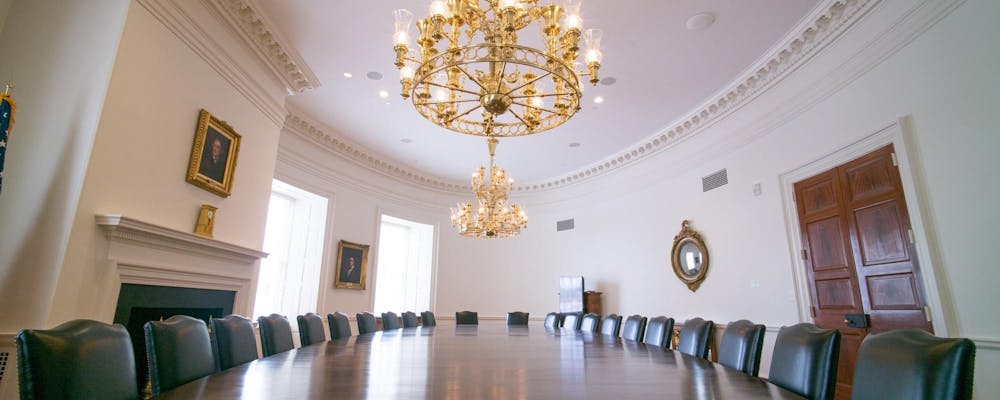The Board of Visitors governs the University, in everything from financial budgeting to infrastructure to long-term planning. While we may accept this as just a regular University operation, it’s truly quite a bizarre one. The state government mandates the Board’s existence — indeed, Boards exist across public universities in Virginia. The Governor appoints its members, and the General Assembly must approve before they go on to serve four-year terms.
However, Board membership is contradictory to the alleged self-governance that the University touts as one of its pillars. A student and faculty member serve as members, but neither are given voting capabilities. University and Charlottesville community members can also attend Board meetings, but they cannot freely make comments. The universities at which Boards exist cannot pick their Board members, impeach their members, substantially challenge their members or even so much as publicly speak to their members. We are governed by a body that we have no real input in.
For context, the University’s Board consists of recent members such as the following. James B. Murray Jr. is a founder of Columbia Capital, an information technology venture franchise with funds of over $3 billion. Robert M. Blue serves as Dominion Energy’s president and CEO, amassing over $2 million in salary each year. John A. Griffin is president of Blue Ridge Capital, an investment firm that has reached $12 billion in assets. In total, the Board has 17 governor-appointed members, all of whom have wealth-amassing careers — most with powerful positions at powerful companies and firms.
For further context, students fought for months on end to secure a tuition freeze for this upcoming academic year. The Young Democratic Socialists of America at U.Va. led a tireless effort petitioning the Board to halt its considerations of raising tuition during a financially and emotionally exasperating pandemic. The Board listened — but not without remaining put on its exploitative decision to maintain an additional $2,700 in tuition from all students enrolled in the College of Arts and Sciences who entered the University in 2019.
One could argue that a multibillion-dollar university like ours needs a governing body that knows how to handle large funds. However, one would be naïve to pretend most Board members have any care or concern for student wellbeing — and why would they? Billionaires and millionaires do not know the struggle of low-income and first-generation students. They speak the language of million-dollar grants and massive corporations. Students like those petitioning for a tuition freeze speak the language of being able to afford groceries each month, fighting tooth and nail to cover tuition costs. It should be no surprise that Thomas Jefferson served on the University’s very first Board — he was both Governor of Virginia and a University Board member. Jefferson symbolizes a cyclical dialogue between two exclusionary institutions. The University makes clear that it is not meant for low-income students. The state government itself maintains this by limiting the voice of the people it serves — by implementing Boards that sit on a high horse above the students and faculty they supposedly work for.
As Americans, we are used to the richest citizens being in control of our governing institutions. As a matter of fact, many Americans are so ingrained in this capitalist structure that it sparks fear to imagine anything different. Certainly, it can be challenging to accept a new role of ownership and governance — one shared by the people, not forced upon the people. Arguments like the one I make here are often written off as communist, but truthfully, attacks on communism are frequently a means of veiling capitalism’s exploitation.
Disbanding or restructuring the Board to place their power into the hands of Charlottesville residents, University faculty and the student body itself would be a step toward a real University rooted in self-governance. While our calls for change should be targeted toward the Governor — who most current University students could not vote for in 2017 — and the General Assembly, we should recognize that the Board is inherently counterintuitive to the University’s flaunting of student power. However, the first step in this process is to acknowledge the problem — and that is what I’ve attempted to do here.
As we approach another election for the Governor of Virginia, we should place the issue of Board membership on the table. We should combat institutions like these, and I call on all Virginia Governor candidates — specifically Democratic candidate Terry McAuliffe — to address this crucial issue in their platforms.
Bryce Wyles is the Senior Associate Opinion Editor for The Cavalier Daily. He can be reached at b.wyles@cavalierdaily.com.
The opinions expressed in this column are not necessarily those of The Cavalier Daily. Columns represent the views of the authors alone.







